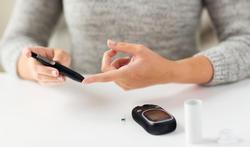Hypoglycemia (also called 'hypo') or too low blood glucose levels mainly affect diabetespatients. In other people, it is very rare. The sugar value in the blood is then less than 70 mg/dL.
How does a hypo arise?
When you ingest carbohydrates (starches and sugars),the body converts these nutrients into glucose. Glucose that ends up in the blood is called blood glucose or blood sugar. The blood glucose level is a measure of the amount of glucose dissolved in the blood. It is expressed in millimoles per litre (mmol/l).
The hormones insulin and glucagon are responsible for healthy blood glucose levels. Insulin ensures the absorption of glucose in the cells where it acts as a kind of key: it opens the doors of the body cells so that the blood glucose can enter. Glucagon, on the other hand, allows glucose to come out of the cells. If this symbiotic game of hormones does not work properly, then you can get a hypo.
Symptoms
If the blood sugar level is too low, you may suffer from:
- palpitations;
- sweating;
- hunger;
- tremving;
- a restless feeling;
- headaches;
- confusion, difficulty concentrating;
- double vision;
- become unconscious.
The symptoms vary from person to person, but even in one and the same person they can differ. So be alert when someone with diabetes starts behaving strangely.
Treatment
If you feel hypoglycemia coming, eat a sweet snack whose sugars are quickly absorbed into the body (fast sugars). If the symptoms persist after ten minutes, take another sweet snack. Suggestions for snacks with fast sugars are: half a glass of fruit juice, a tablespoon of honey, half a glass of soda (no light or zero), two to three lumps of sugar, four to five tablets of grape sugar. After that, you can take sugars that are absorbed more slowly, for example a sandwich, a piece of fruit or a fiber-rich cake.
If you are being treated with insulin, keep a syringe of glucagon nearby for emergencies. Glucagon causes the sugar level in the blood to rise again. People around you can administer this syringe when you are unconscious. After all, you are not allowed to eat and drink sugars, because you could choke.
If you decide to consult your doctor, he will perform a finger prick to determine the sugar level in the blood and let you eat fast sugars if that has not already happened. He can also check if you are taking too much insulin. In that case, he can lower your insulin dose or change the time of your last dose.




